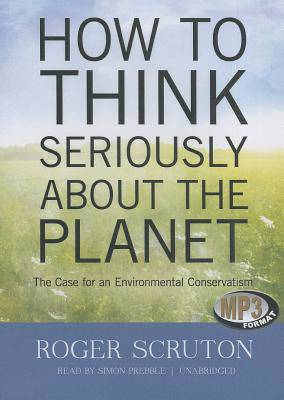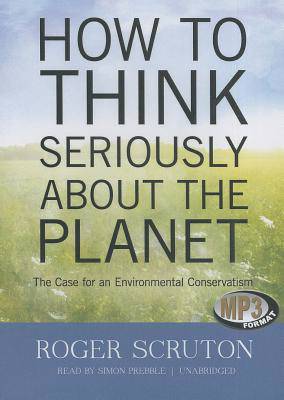
- Afhalen na 1 uur in een winkel met voorraad
- Gratis thuislevering in België vanaf € 30
- Ruim aanbod met 7 miljoen producten
- Afhalen na 1 uur in een winkel met voorraad
- Gratis thuislevering in België vanaf € 30
- Ruim aanbod met 7 miljoen producten
Zoeken
How to Think Seriously about the Planet LUISTERBOEK
The Case for an Environmental Conservatism
Roger Scruton
CD | Engels
€ 43,45
+ 86 punten
Uitvoering
Omschrijving
The environment has long been the undisputed territory of the political Left, which casts international capitalism, consumerism, and the overexploitation of natural resources as the principle threats to the planet and sees top-down interventions as the most effective solution. In How to Think Seriously about the Planet, Roger Scruton rejects this view and offers a fresh approach to tackling the most important political problem of our time. He contends that the environmental movement is philosophically confused and has unrealistic agendas. Its sights are directed at large-scale events and the confrontation between international politics and multinational business. But Scruton argues that no large-scale environmental project, however well intentioned, will succeed if it is not rooted in small-scale practical reasoning. Seeing things on a large scale promotes top-down solutions, managed by unaccountable bureaucracies that fail to assess local conditions and rife with unintended consequences. Scruton calls for the greater efficacy of local initiatives over global schemes, civil association over political activism, and small-scale institutions of friendship over regulatory hypervigilance, suggesting that conservatism is far better suited to solving environmental problems than either liberalism or socialism. Rather than entrusting the environment to unwieldy NGOs and international committees, we must assume personal responsibility and foster local control. People must be empowered to take charge of their environment, to care for it as they would a home, and to involve themselves through the kind of local associations that have been the traditional goal of conservative politics. Our common future is by no means assured, but as Roger Scruton clearly demonstrates in this important book, there is a path that can ensure the future safety of our planet and our species.
Specificaties
Betrokkenen
- Auteur(s):
- Uitgeverij:
Inhoud
- Taal:
- Engels
Eigenschappen
- Productcode (EAN):
- 9781470822330
- Verschijningsdatum:
- 1/06/2012
- Uitvoering:
- CD
- Formaat:
- MP3-formaat
- Afmetingen:
- 135 mm x 188 mm
- Gewicht:
- 90 g

Alleen bij Standaard Boekhandel
+ 86 punten op je klantenkaart van Standaard Boekhandel
Beoordelingen
We publiceren alleen reviews die voldoen aan de voorwaarden voor reviews. Bekijk onze voorwaarden voor reviews.








